
 i_need_contribute
i_need_contribute

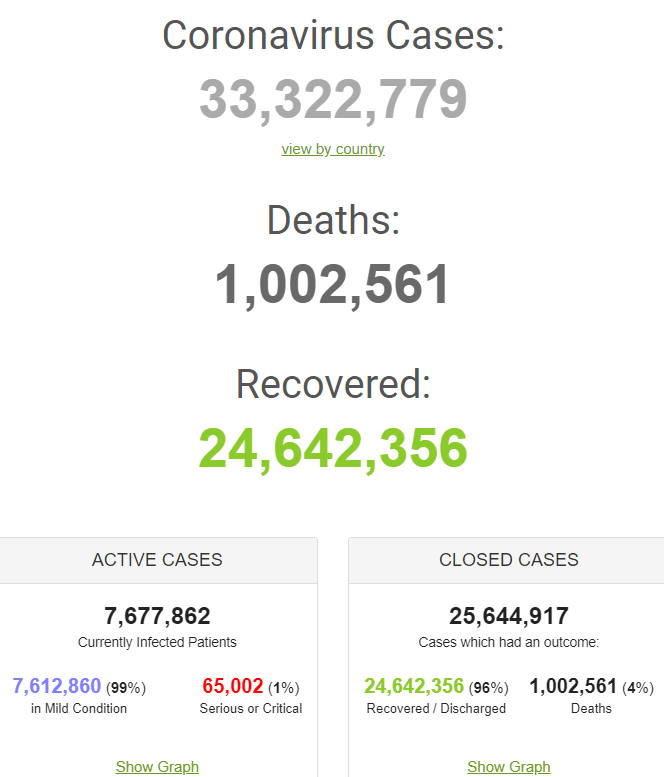
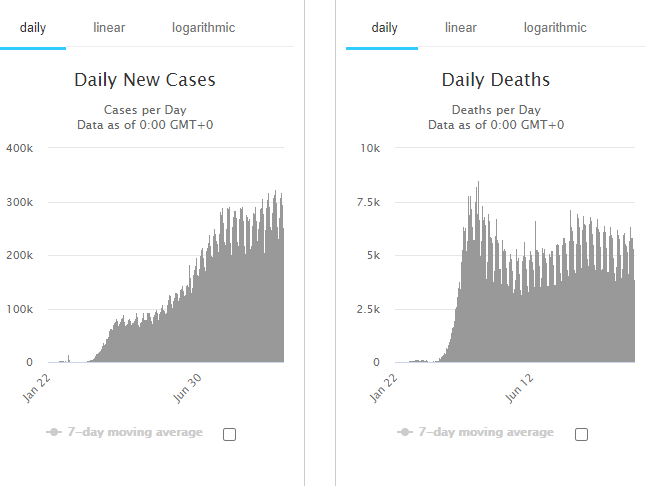
|
Country, |
Total |
New |
Total |
|
World |
33,298,945 |
+251,904 |
1,002,158 |
|
7,321,343 |
+33,782 |
209,453 |
|
|
6,073,348 |
+82,767 |
95,574 |
|
|
4,732,309 |
+14,194 |
141,776 |
|
|
1,151,438 |
+7,867 |
20,324 |
|
|
813,056 |
+7,018 |
25,488 |
|
|
805,302 |
+5,160 |
32,262 |
|
|
735,198 |
31,232 |
||
|
726,431 |
+5,573 |
76,243 |
|
|
711,325 |
+8,841 |
15,749 |
|
|
670,766 |
+1,268 |
16,398 |
|
|
538,569 |
+11,123 |
31,727 |
|
|
457,901 |
+1,922 |
12,641 |
|
|
446,448 |
+3,362 |
25,589 |
|
|
434,969 |
+5,693 |
41,988 |
|
|
359,148 |
+1,275 |
5,161 |
|
|
349,450 |
+3,481 |
8,990 |
|
|
333,193 |
+403 |
4,683 |
|
|
314,433 |
+1,467 |
7,997 |
|
|
310,275 |
+694 |
6,457 |
|
|
309,870 |
+1,766 |
35,835 |
|
|
304,215 |
+2,984 |
5,344 |
|
|
286,338 |
+1,313 |
9,534 |
|
|
275,213 |
+3,874 |
10,386 |
|
|
231,026 |
+3,926 |
1,466 |
|
|
198,634 |
+3,130 |
3,959 |
|
|
153,125 |
+1,454 |
9,268 |
|
|
134,747 |
+766 |
11,279 |
|
|
133,592 |
+370 |
7,828 |
|
|
125,084 |
+234 |
214 |
|
|
122,673 |
+1,438 |
4,718 |
|
|
117,685 |
+2,444 |
2,069 |
|
|
112,803 |
+1,827 |
9,974 |
|
|
111,626 |
+2,995 |
6,374 |
|
|
Dominican |
111,386 |
+429 |
2,095 |
|
110,555 |
+447 |
2,340 |
|
|
107,723 |
+64 |
1,699 |
|
|
103,544 |
+345 |
601 |
|
|
102,840 |
+104 |
5,883 |
|
|
97,450 |
+1,543 |
909 |
|
|
91,469 |
+851 |
412 |
|
|
90,092 |
+390 |
3,229 |
|
|
87,330 |
+1,350 |
2,432 |
|
|
85,351 |
+14 |
4,634 |
|
|
81,690 |
+635 |
1,545 |
|
|
77,609 |
+320 |
818 |
|
|
74,548 |
+708 |
2,288 |
|
|
73,604 |
+665 |
1,953 |
|
|
73,394 |
+1,573 |
477 |
|
|
73,332 |
+632 |
1,170 |
|
|
72,691 |
+751 |
606 |
|
|
72,049 |
+1233 |
828 |
|
|
69,361 |
+586 |
242 |
|
|
64,597 |
+1,303 |
606 |
|
|
58,324 |
+126 |
1,108 |
|
|
57,700 |
+15 |
27 |
|
|
55,320 |
+501 |
458 |
|
|
51,067 |
+153 |
1,714 |
|
|
50,875 |
+341 |
1,287 |
|
|
49,400 |
+328 |
951 |
|
|
46,387 |
+165 |
299 |
|
|
46,251 |
+161 |
1,063 |
|
|
42,876 |
+662 |
787 |
|
|
40,023 |
+128 |
586 |
|
|
38,703 |
+450 |
291 |
|
|
38,684 |
+762 |
803 |
|
|
38,115 |
+244 |
691 |
|
|
36,254 |
+1,012 |
347 |
|
|
34,990 |
+430 |
1,802 |
|
|
33,384 |
+72 |
747 |
|
|
32,364 |
+536 |
520 |
|
|
28,630 |
+215 |
826 |
|
|
27,040 |
+24 |
872 |
|
|
26,637 |
+424 |
649 |
|
|
24,014 |
+937 |
736 |
|
|
23,611 |
+95 |
401 |
|
|
20,735 |
+23 |
418 |
|
|
20,055 |
+58 |
796 |
|
|
19,629 |
+29 |
120 |
|
|
17,629 |
+146 |
725 |
|
|
17,444 |
+216 |
379 |
|
|
16,285 |
+28 |
229 |
|
|
16,197 |
+190 |
272 |
|
|
16,114 |
+1,722 |
214 |
|
|
14,909 |
+40 |
308 |
|
|
14,641 |
+29 |
332 |
|
|
13,698 |
+71 |
270 |
|
|
13,259 |
+106 |
377 |
|
|
11,033 |
+115 |
120 |
|
|
10,919 |
+150 |
134 |
|
|
10,734 |
+743 |
226 |
|
|
10,612 |
+19 |
271 |
|
|
10,313 |
+116 |
158 |
|
|
10,098 |
+53 |
34 |
|
|
9,682 |
+105 |
343 |
|
|
9,646 |
+41 |
75 |
|
|
9,078 |
+478 |
44 |
|
|
8,492 |
+431 |
45 |
|
|
8,357 |
+46 |
124 |
|
|
7,983 |
+226 |
58 |
|
|
7,812 |
+9 |
227 |
|
|
7,530 |
+166 |
73 |
|
|
7,464 |
+2 |
161 |
|
|
6,017 |
+163 |
89 |
|
|
5,768 |
+2 |
179 |
|
|
5,457 |
+45 |
122 |
|
|
5,431 |
+12 |
108 |
|
|
5,350 |
+159 |
147 |
|
|
5,254 |
+294 |
28 |
|
|
5,066 |
+6 |
105 |
|
|
4,835 |
+4 |
102 |
|
|
4,820 |
+9 |
29 |
|
|
4,718 |
+46 |
174 |
|
|
4,072 |
+34 |
192 |
|
|
3,844 |
+12 |
25 |
|
|
3,523 |
+1 |
59 |
|
|
1,833 |
+2 |
25 |
|
|
1,696 |
+12 |
22 |
Retrieved from: https://www.worldometers.info/coronavirus/
Opinion from Dean Obeidallah
Editor's Note: Dean Obeidallah, a former attorney, is the host of SiriusXM radio's daily program "The Dean Obeidallah Show" and a columnist for The Daily Beast. The opinions expressed in this commentary are his own.
Over the past two weeks, an alarming 24% rise in the number of new Covid-19 cases confirmed on a daily basis in the United States has raised the daily infection average to nearly 43,000. Twice last week the US broke 50,000 new cases confirmed in a day. While that's below the daily average of 65,000 in July's deadly spike, it's still well above the 35,000 daily new cases seen just a few weeks ago.
Does that mean Donald Trump is now going to stop having rallies where he jams thousands on top of each other with few wearing masks -- as he did Saturday night in Pennsylvania -- and instead promote social distancing to prevent any further upticks in the virus? Stop laughing. Of course it doesn't.
Trump typically only does what he believes benefits himself personally and, in this case, he apparently believes the optics of holding packed rallies will somehow help his flailing campaign close the nine-point gap between him and Democratic nominee Joe Biden.
Instead, Trump's latest ploy is to try to convince voters into believing he did a great job handling the virus -- and the worst part is he's using our tax dollars to do this. As Politico recently reported, Trump's Department of Health and Human Services (HHS) is moving quickly to roll out a $300 million-plus advertising campaign to "defeat despair" about Covid-19. The campaign will include celebrities like actor Dennis Quaid and singer CeCe Winans and Politico reported that HHS is said to be pursuing television host Dr. Mehmet Oz and musician Garth Brooks to take part as well.
From CNN's Evan McMorris-Santoro and Yon Pomrenze
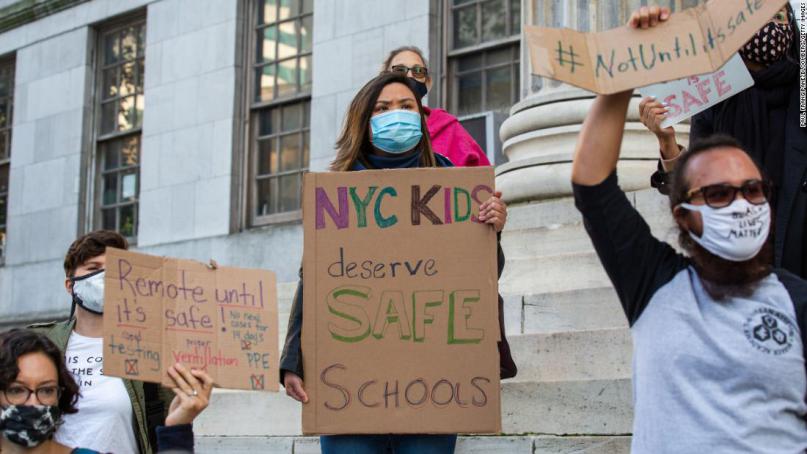
This week is a big test for the New York City public school system, the largest in the United States. After a chaotic couple of months, officials say they're finally ready to invite students back into classrooms.
Now they have to convince parents and teachers it's safe.
New York Gov. Andrew Cuomo announced August 7 that schools in the state could reopen classrooms for the fall. That was about a month before the scheduled start of the New York City school year. But Cuomo didn't order schools to reopen -- he left that decision to local leaders.
In New York City, that meant Mayor Bill de Blasio, schools commissioner Richard Carranza and a host of other involved parties like teachers' union leaders and parents' groups. It proved to be a huge challenge.
First, the city announced schools would open to students on September 10. That got delayed until September 21. And then that date was delayed to September 29, and the start of in-person education was split into several dates. Kindergarten through eighth grade starts on Tuesday, while middle school and high school students have to wait until October 1. And in-person education is limited: a hybrid schedule keeps students in the classroom only a few days a week, with the rest of their learning online.
It's a complicated schedule, the result of political negotiations and ongoing concern about a new spread of Covid-19 in the city that was once the hardest hit in the United States.
Retrieved from: https://edition.cnn.com/world/live-news/coronavirus-pandemic-09-28-20-intl/index.html
By Antonia Farzan
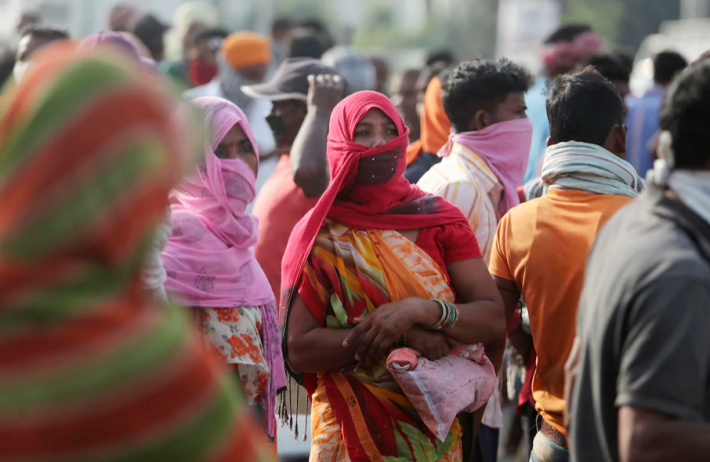
Migrant laborers from other states looking for work gather on a street on the outskirts of Jammu, India on Sunday. (Channi Anand/AP)
India’s soaring tally of coronavirus infections surpassed 6 million on Monday, reflecting an increase of 1 million cases in just two weeks.
Home to the world’s second-largest coronavirus outbreak, the country is on track to outpace the United States in October and claim the undesirable distinction of having the world’s highest count of coronavirus cases. The United States surpassed 7 million cases over the weekend, and has been adding new infections at roughly half the rate of India.
India has reported more than 587,000 cases in the past week alone. Health Ministry officials said Monday that the total had increased by 82,000 in the past 24 hours‚ a shockingly high tally but still fewer than the record of nearly 98,000 cases that was set earlier this month. Overall, the number of cases being reported each day has declined since mid-September, which may not be a positive development considering that testing has also declined.
With roughly 95,500 reported fatalities, India has a notably lower death toll than Brazil and the United States, though experts caution that the number is almost certainly an undercount and may not reflect many deaths in rural areas. Many hospitals are struggling to get adequate supplies of oxygen as the number of people with severe symptoms surges, particularly in rural areas with a weak health care infrastructure.
By Michael Birnbaum, Loveday Morris and Quentin Ariès
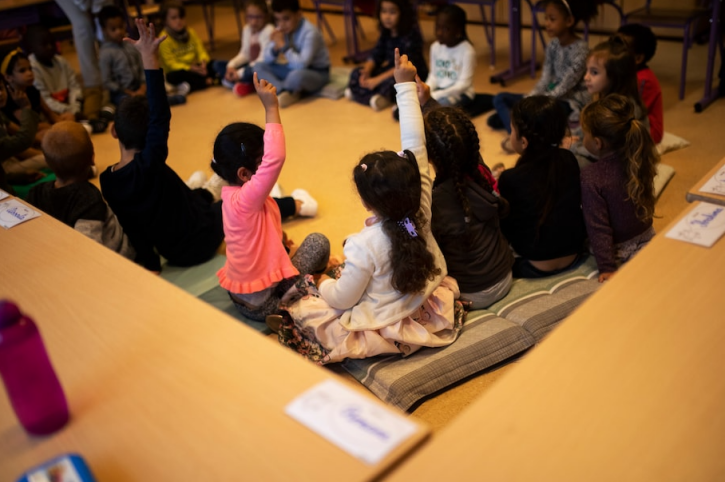
Children attend class at the Heembeek primary school in Brussels. (Francisco Seco/AP)
The first sign that something was wrong at the lone school in the tiny Belgian hamlet of Sibret was when a teacher began to feel sick not long after classes resumed this month. She tested positive for the coronavirus. Within days, 27 students and five other teachers also tested positive.
Now the village of 800 in Belgium’s rural southeast corner has become one of the latest data points in a complicated, angst-ridden experiment for communities around the world: How much does in-person schooling contribute to the spread of the virus?
The answer, experts are saying in Europe after several weeks back in classrooms, is that it’s rare for children to spread the virus within the walls of a school, but not unheard of. Not every country can point to a school where the coronavirus seems to have spread. And even where there are such schools, including in Belgium, Norway and Germany, such outbreaks typically remain countable on a single hand — affecting a fraction of a percentage point of the millions of students and teachers in session across the continent.
Retrieved from: https://www.washingtonpost.com/nation/2020/09/28/coronavirus-covid-live-updates-us/
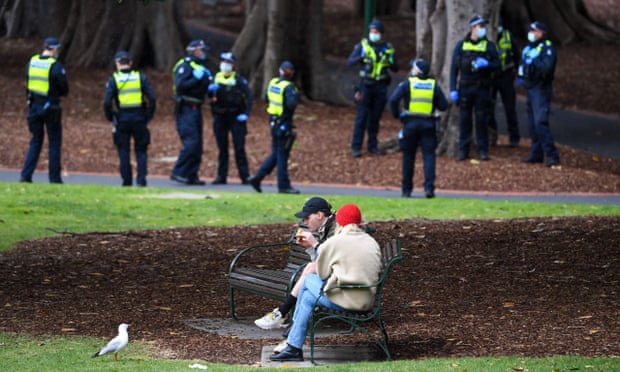
A couple enjoy a break while police patrol Treasury Gardens in Melbourne over the weekend. During Victoria’s first wave of coronavirus, approximately 42% of those fined for breaching gathering rules were under the age of 24. Photograph: William West/AFP/Getty Images
As the Victorian government ramps up penalties to $5,000 for breaching Covid-19 gathering rules, statistics show young people received almost half of all fines dished out during the state’s first wave, while the South Sudanese and Aboriginal communities received an outsize number of fines.
Data released by the Crime Statistics Agency last week shows there were 6,062 breaches of Covid-19 rules associated with 5,474 people during the first wave of the coronavirus pandemic in Victoria.
The average age was 29.5 years, and just one in four of those fined were women. Approximately 42% of those were under the age of 24.
According to the data provided to community legal centres, of the over 6,000 recorded breaches, there were just 67 warning notices issued. Only six businesses were issued with fines.
Throughout the pandemic, Victoria police has been releasing daily updates on the number of fines worth $1,652 issued the previous day, highlighting some of the most flagrant breaches, which some refer to as the “covidiots” of the day. But it doesn’t give a full picture of how police are fining people for Covid-19 public health order breaches.
Tiffany Overall, advocacy and human rights officer at Youthlaw, told Guardian Australia that based on those who approached Youthlaw seeking legal advice on fines, it appeared police were not using discretion all that frequently when fining young people.
Overall said she was concerned about the volume of young people being pulled into the legal system when the breaches – if they were even breaches – were not flagrant.
“Often there was confusion about what the rules actually meant,” she said. “Or technically it wasn’t even a breach. We would actually be challenging a lot of the fines matters that we’ve seen.”
Victoria police told Guardian Australia the data does not record informal warnings or conversations officers had with members of the public about breaching the orders, and said “countless” informal warnings had been issued since the pandemic began.
“Informal warnings and conversations were most often preferred over the issuing of formal warnings or cautions in the early stages of restrictions,” a spokesman said.
People who were born in South Sudan and Sudan were overrepresented in the fines issued. They made up 5% of the fines but only make up around 0.14% of the Victorian population. Aboriginal and Torres Strait Islander people made up 4.7% of the fines, despite making up just 0.8% of the population in Victoria.
Ashleigh Newnham from Springvale Monash Legal Service said people from migrant background who were fined included a pair of Tamil refugees who were sleeping rough, and were fined when they ran into others when on their walk, with police allegedly assuming a group of four had gone out together in breach of the rules.
“They couldn’t explain that they weren’t all from the same household, in fact, and they weren’t out together – they just saw each other and stopped and said ‘hi’. And then all four of them got fine,” she said.
“The language barrier prevented them from being able to explain and also, they’re terrified [of police].”
Newnham said during the second wave a couple who were driving home from work together were fined by police for not wearing masks because police believed they were co-workers, not a couple who happened to work together. The couple did not speak English well enough to explain they were also married.
This week, Newnham said she was working to set up support services for the South Sudanese community in particular due to the large number of fines people within that community had been receiving.
A Victoria police spokesman said police had been working with support agencies to prevent rough sleepers being issued with fines, and officers had been “trained to understand the importance of interacting sensitively and respectfully with people from all backgrounds, including those from multicultural communities and vulnerable community groups who have complex needs”.
“It is not in the community’s interest to issue infringements to vulnerable community groups, such as people experiencing issues such as homelessness which require referrals to support organisations,” the spokesman said.
Victoria police reviews every fine to assess whether they’ve been issued appropriately, and despite Victoria police stating “a number of fines” have been withdrawn as a result of these reviews, Newnham and Overall said they had seen little evidence of fines being withdrawn through this process.
“We’re seeing really, pretty ridiculous fines come through the door. So you would have thought they would have got pulled up at that stage,” Overall said.
After the internal review process, the person fined can seek another review through Fines Victoria, but Overall said while many of the cases Youthlaw had taken on were pending, none of the community legal services were yet aware of a fine being overturned.
“None of them have been successful, even if we’ve thought that young person had really good grounds to be challenging that fine,” she said.
Overall said it was risky for young people to challenge the fines because the matter could end up being heard in open court if the review was not successful
“It’s a calculated decision, whether you go that route, weighing up the pros and cons.”
The data provided by the Crime Statistics Agency only covers March to June. Victoria police declined to provide data on the total number of fines issued throughout the pandemic. 7News reported a massive increase in the number of fines issued in the second wave, with over 23,000 fines since March, and reported less than one-third had been paid.
On Sunday, the Victorian premier, Daniel Andrews, announced an increase in the fines for people breaching the rules on gatherings in Melbourne from $1,652 to $5,000.